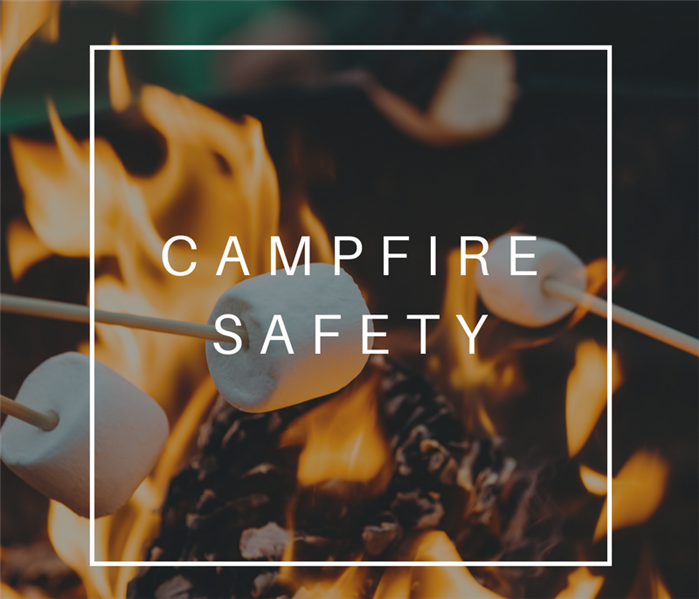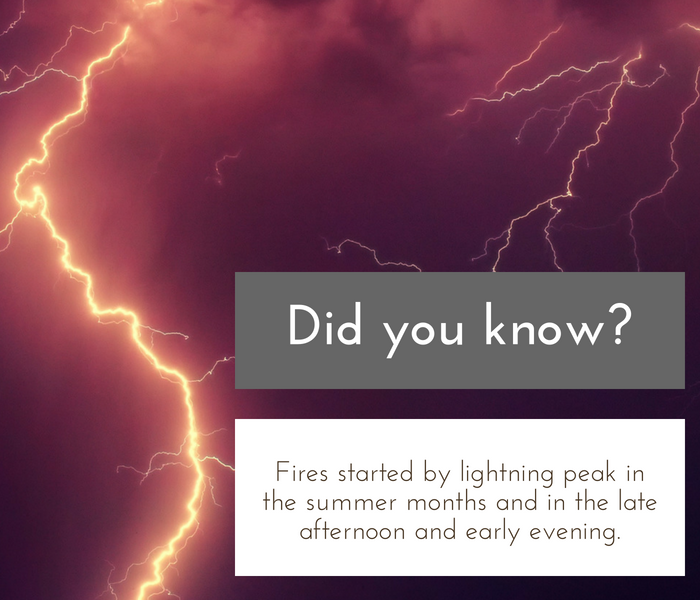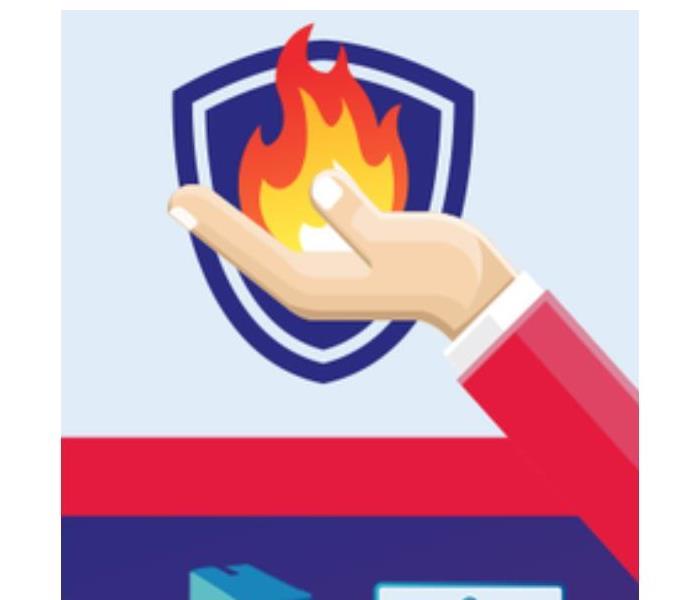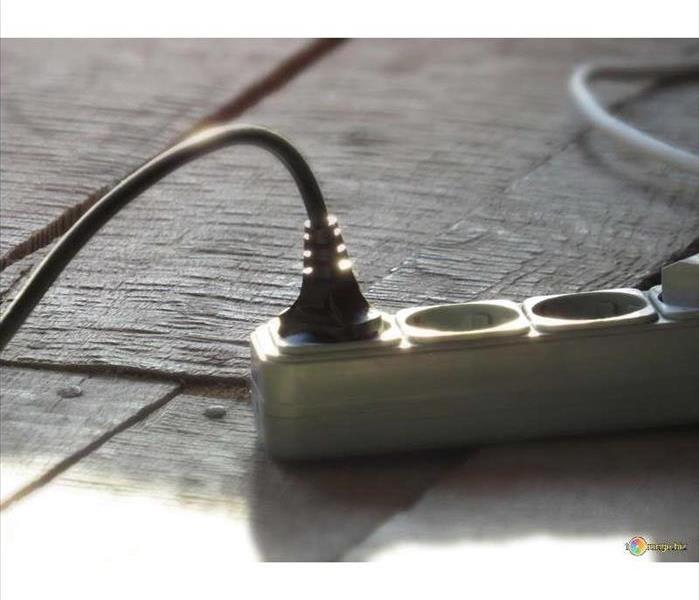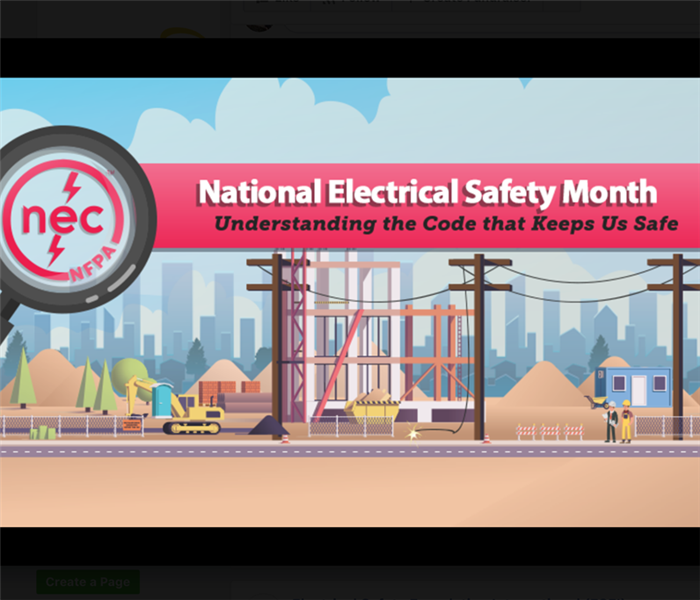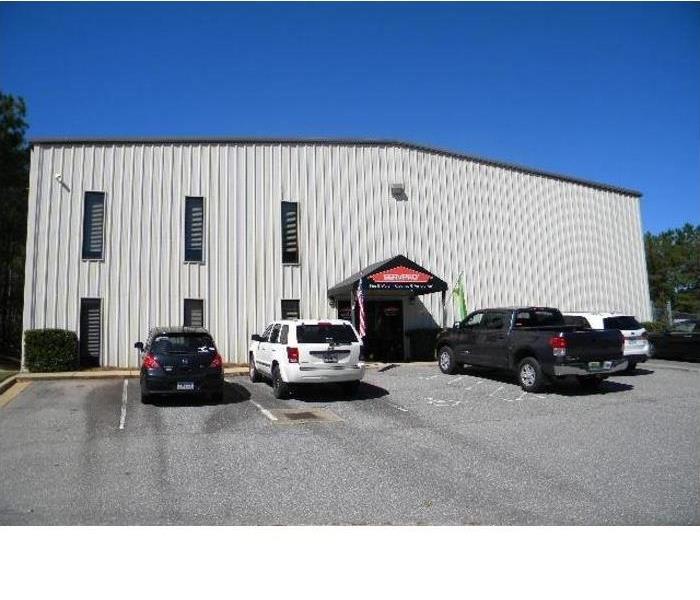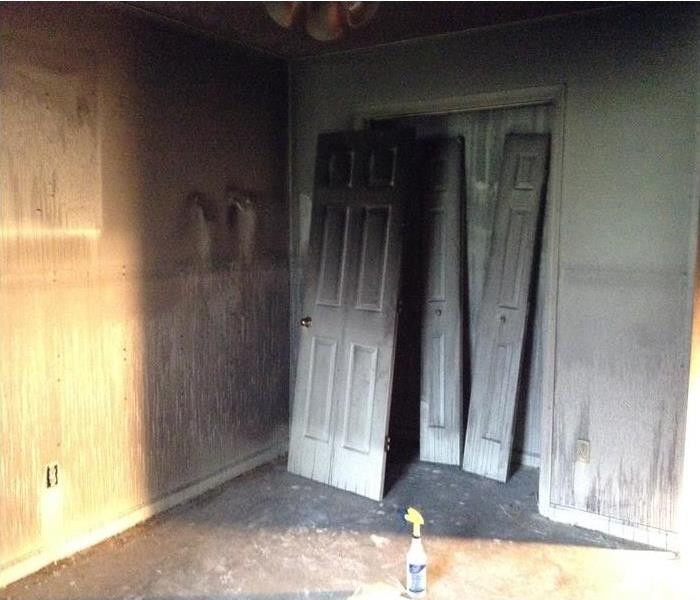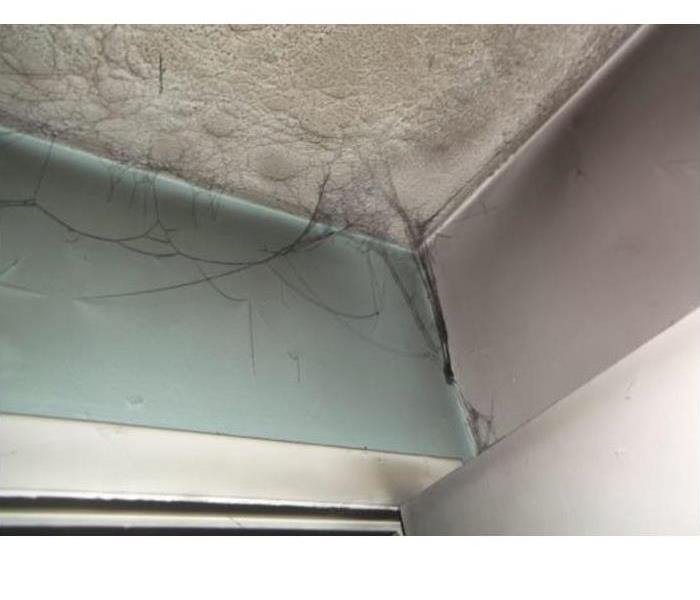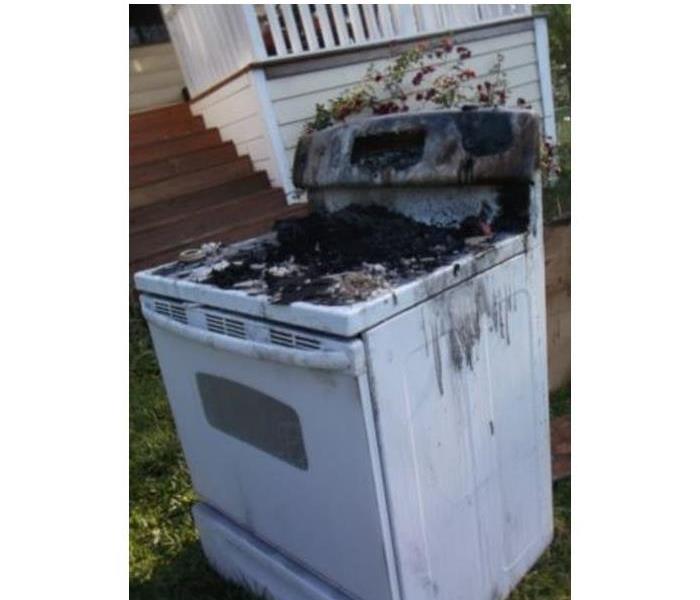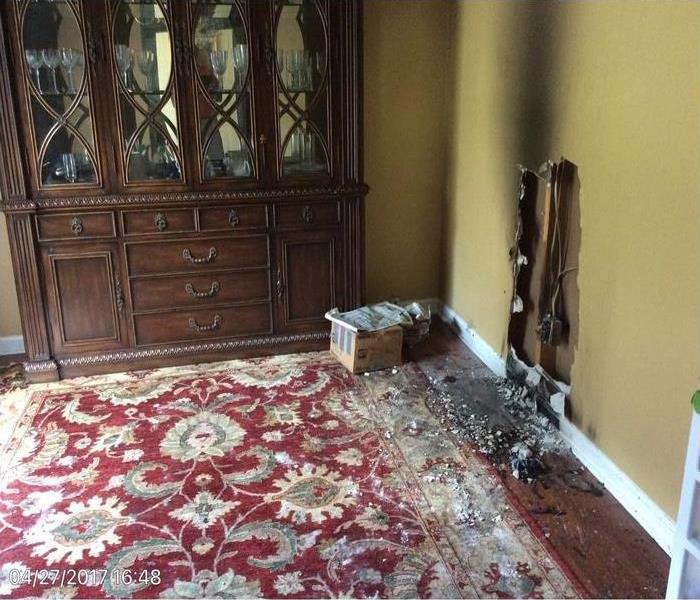Recent Fire Damage Posts
Avoid Fires Charging Your EV At Your Lee County Home
5/3/2023 (Permalink)
Did you know that there are over one million electric vehicles on the road in the United States? We wanted to share safety tips to keep our Lee County community safe and prepared against the risks of home fires when charging an electric vehicle (EVs). Thanks to our friends over at the U.S. Fire Administration for curating these great tips for us to share with our audience.
We first need to describe the two types of home charging.
- Level 1 uses the charger included with the EV. These chargers are plugged into a standard 120-volt outlet.
- Level 2 charging uses a charger that is sold separately from the EV and allows for faster charging times. They are plugged into a 240-volt outlet.
Before buying an electric vehicle, you'll want to have a qualified electrician install a new, dedicated circuit for your charging device. Older home wiring may not be suitable for use with electric vehicle supply equipment, but be sure to consult with your electrician.
Here are the tips to help keep you & our community safe when you are charging an electric vehicle.
- Follow manufacturer guidelines when charging your vehicle. Check with your local dealer if you need additional information.
- Purchase a charging device that is certified by a nationally recognized testing laboratory.
- Plug Level 1 EV chargers directly into an outlet designed to handle the amperage of the charging device. Never use a multi-plug adapter or extension cord.
- Install a residual current device with the charging unit. It will turn off the power if a fault is detected and help prevent a fire.
- Place all charging device components out of reach of children when not in use.
- Maintain the components of your charging station according to the manufacturer’s maintenance guidelines. Signs of excessive wear may indicate a potential shock hazard.
- Never use an EV charger with obvious signs of damage.
- Cover the EV charging station outlet to stop water from entering. Check the manufacturer's guidelines to make sure it is safe to charge your EV in wet conditions.
SERVPRO of Lee County is locally owned and operated, so we’re already close by and ready to respond immediately when you need us. We make disaster "Like it never even happened." Give us a call today at (334)-821-4858!
How to Safely Enjoy Campfires in 2023
5/1/2023 (Permalink)
Campfires are a great way to enjoy the outdoors and spend time with friends and family - especially during the warm summer months. However, it's important to remember that campfires can be dangerous if not done safely. Here are some tips for campfire safety:
Choose a safe location: Choose a location that is at least 15 feet away from tents, trees, and other flammable objects. Ensure the site is level and clear of any debris.
Keep a bucket of water or sand nearby: In case of an emergency, keep a bucket of water or sand nearby to quickly put out any flames.
Build the fire correctly: Build the fire in a fire pit or ring, using only dry wood or charcoal. Never use gasoline, lighter fluid, or other flammable liquids to start the fire.
Supervise the fire at all times: Always keep a close eye on the fire and never leave it unattended. If you need to leave the area, make sure the fire is completely extinguished before leaving.
Extinguish the fire properly: When you're ready to put out the fire, use water or sand to completely extinguish the flames. Stir the ashes and make sure everything is completely cool to the touch before leaving the area.
Follow local regulations: Be aware of local regulations and any fire bans in the area. Always follow the rules and guidelines to ensure everyone's safety.
By following these tips, you can enjoy a campfire safely and responsibly. Remember, it's everyone's responsibility to prevent wildfires and keep our forests and parks safe.
SERVPRO of Lee County is locally owned and operated, so we’re already close by and ready to respond immediately when you need us. We make disaster "Like it never even happened." Give us a call today at (334)-821-4858!
Electrical Safety Tips
2/11/2022 (Permalink)
Electricity helps make our lives easier but there are times when we can take its power and its potential for fire-related hazards for granted. Let's talk about a few electrical safety tips to follow to keep your home fire-safe.
• Always plug major appliances, like refrigerators, stoves, washers and dryers, directly into a wall outlet.
• Never use an extension cord with a major appliance — it can easily overheat and start a fire.
• Always plug small appliances directly into a wall outlet.
• Unplug small appliances when you are not using them.
• Keep lamps, light fixtures and light bulbs away from anything that can burn.
• Use light bulbs that match the recommended wattage on the lamp or fixture.
• Check electrical cords on appliances often. Replace cracked, damaged and loose electrical cords. Do not try to repair them.
Thank you to U.S. Fire Administration for sharing these tips for us to share with our customers!
Portable Space Heater Safety
10/28/2021 (Permalink)
With the weather here in Lee County, Alabama finally feeling like fall, we wanted to share a few tips on how to make sure to keep safety in mind when using a portable space heater in your home to lower your risk of a home fire.
Portable Space Heaters
- Keep combustible objects at least three feet away from portable heating devices.
- Buy only heaters evaluated by a nationally recognized laboratory, such as Underwriters Laboratories (UL).
- Check to make the portable heater has a thermostat control mechanism and will switch off automatically if the heater falls over.
- Only use crystal clear K-1 kerosene in kerosene heaters. Never overfill it. Use the heater in a well-ventilated room.
Thanks to Ready.gov for these great tips!
SERVPRO of Lee County is locally owned and operated, so we’re already close by and ready to respond immediately when you need us. We make disaster "Like it never even happened." Give us a call today at (334)-821-4858!
NPM 2021: Week Four "Teach Youth About Preparedness"
9/20/2021 (Permalink)
Welcome to the fourth and final week of 2021 National Preparedness Month! The theme for this week is teaching youth about preparedness.
Whether you’re a kid or teen yourself, a parent or loved one, or work with youth, Ready Kids has tools and information to help before, during and after disasters.
Ready.gov has a special website dedicated to educating youth called Ready Kids. We are so excited to share this resource because it is filled with AMAZING tools to help teach kids and teens about preparedness. It includes resources, games, and so much more! Be sure to check it out and let us know on social media what you think.
Disasters happen everywhere, and every member of the family can prepare. Preparedness for the future starts today.
Thank you all for joining us for our weekly NPM 2021 blog series! We hope that each week helped you become more prepared.
SERVPRO of Lee County is locally owned and operated, so we’re already close by and ready to respond immediately when you need us. We make disaster "Like it never even happened." Give us a call today at (334)-821-4858!
Fire Extinguisher Safety in Lee County, Alabama
8/24/2021 (Permalink)
Do you know when to use a fire extinguisher in your Lee County home or business? We wanted to create a short blog series sharing information about fire extinguishers. Up first in our series is covering when to use a fire extinguisher. We are sharing information directly from the U.S. Fire Administration.
Fire extinguishers can be helpful on a small fire. Consider providing a checklist to help people prepare to use a fire extinguisher on a potential fire.
For example:
- Have I alerted others in the building that there’s a fire?
- Has someone called the fire department?
- Am I physically able to use a fire extinguisher?
- Is the fire small and contained in a single object (like a pan or a wastebasket)?
- Am I safe from the fire’s toxic smoke?
- Do I have a clear escape route?
Use a fire extinguisher when all of these questions are answered “yes.” If you’re unsure about whether or not it’s safe to use a fire extinguisher, and for all other situations, alert others, leave the building, and call 911 from your cell phone or neighbor’s phone.
Stay tuned for our next blog post covering an easy to remember acronym to help remember how to use a fire extinguisher.
SERVPRO of Lee County is locally owned and operated, so we’re already close by and ready to respond immediately when you need us. We make disaster "Like it never even happened." Give us a call today at (334)-821-4858!
How to Use a Fire Extinguisher
8/24/2021 (Permalink)
Welcome to part two of our fire extinguisher safety series. In this blog, we're sharing an easy to remember acronym from our friends over at the U.S. Fire Administration that teaches how to properly operate a fire extinguisher.
When operating a fire extinguisher, remember the word PASS:
- Pull the pin. Hold the extinguisher with the nozzle pointing away from you and release the locking mechanism.
- Aim low. Point the extinguisher at the base of the fire.
- Squeeze the lever slowly and evenly.
- Sweep the nozzle from side-to-side.
Up next on the blog, we're covering why fire extinguisher maintenance matters. Stay tuned!
SERVPRO of Lee County is locally owned and operated, so we’re already close by and ready to respond immediately when you need us. We make disaster "Like it never even happened." Give us a call today at (334)-821-4858!
Fire Extinguisher Maintenance in Auburn, Alabama
8/24/2021 (Permalink)
Welcome to the third and final blog post in our series on fire extinguisher safety. To end this series, we're going to be sharing information from the U.S. Fire Administration on how to properly maintain your fire extinguisher in your Lee County, Alabama home or business.
Here's what you should be checking for in order to maintain your fire extinguisher.
- Easy access in an emergency
- Be sure nothing is blocking or limiting your ability to reach it.
- The recommended pressure level
- Many extinguishers have gauges that show when pressure is too high or too low.
- Working parts
- Make sure the can, hoses and nozzles aren’t damaged, dented, or rusted.
- Cleanliness
- Remove any dust, oil, or grease that might be on the outside of the extinguisher.
- Guidelines and instructions
- Some extinguishers need to be shaken monthly, others need to be pressure tested every few years.
We hope that you enjoyed this mini-series on fire extinguishers. What do you want our next series to cover? Shoot us a message on your favorite social media and you just might see it covered soon.
SERVPRO of Lee County is locally owned and operated, so we’re already close by and ready to respond immediately when you need us. We make disaster "Like it never even happened." Give us a call today at (334)-821-4858!
Smoke Alarms & Accessibility
2/10/2021 (Permalink)
We've talked about smoke alarms before, but you can never have enough reminders. The fact is that a working smoke alarm significantly increases your changes of surviving a deadly home fire.
Smoke Alarms
- Replace batteries twice a year, unless you are using 10-year lithium batteries.
- Install smoke alarms on every level of your home, including the basement.
- Replace the entire smoke alarm unit every 10 years or according to manufacturer’s instructions.
- Never disable a smoke alarm while cooking – it can be a deadly mistake.
Here's what we haven't talked about before... We want to talk about smoke alarm safety for those with access or functional needs.
Smoke Alarm Safety for People with Access or Functional Needs
- Audible alarms for visually impaired people should pause with a small window of silence between each successive cycle so that they can listen to the instructions or voices of others.
- Smoke alarms with a vibrating pad or flashing light are available for the hearing impaired. Contact your local fire department for information about obtaining a flashing or vibrating smoke alarm.
- Smoke alarms with a strobe light outside the home to catch the attention of neighbors and emergency call systems for summoning help are also available.
A big thanks goes to Ready.gov for providing such great information for us to share!
SERVPRO of Lee County is locally owned and operated, so we’re already close by and ready to respond immediately when you need us. We make disaster "Like it never even happened." Give us a call today at (334)-821-4858!
Smoke Alarms & Survival
9/11/2020 (Permalink)
A working smoke alarm significantly increases your chances of surviving a deadly home fire. (Source) Here are a few tips to make sure that your smoke alarms are protecting your loved ones & your home.
- Install both ionization AND photoelectric smoke alarms, OR dual sensor smoke alarms, which contain both ionization and photoelectric smoke sensors.
- Test batteries monthly.
- Replace batteries in battery-powered and hard-wired smoke alarms at least once a year (except non-replaceable 10-year lithium batteries).
- Install smoke alarms on every level of your home, including the basement, both inside and outside of sleeping areas.
- Replace the entire smoke alarm unit every 8-10 years or according to manufacturer’s instructions.
- Never disable a smoke alarm while cooking – it can be a deadly mistake.
SERVPRO of Lee County is locally owned and operated, so we’re already close by and ready to respond immediately when you need us. We make disaster "Like it never even happened." Give us a call today at (334)-821-4858!
How To Maintain Your Emergency Kit
9/10/2020 (Permalink)
Our blog this week was filled with information on how to build an emergency kit so you're prepared when disaster strikes. September is National Preparedness Month, so we're sharing tips all month long!
After you've assembled your kit, you have to commit to maintaining it to be sure that it will be ready when you need it. Here are a few ways to do that:
- Keep canned food in a cool, dry place.
- Store boxed food in tightly closed plastic or metal containers.
- Replace expired items as needed.
- Re-think your needs every year and update your kit as your family’s needs change.
SERVPRO of Lee County is locally owned and operated, so we’re already close by and ready to respond immediately when you need us. We make disaster "Like it never even happened." Give us a call today at (334)-821-4858!
NPM 2020: Week 2
9/8/2020 (Permalink)
Welcome to Week 2 of National Preparedness Month! We're sharing resources from our friends at Ready.gov each week this month.
This week's topic is to build a kit. If you'd like additional information regarding building an emergency kit, please visit their website.
Let's start with the basics of building a kit. What should you include in it? After an emergency, you may need to survive on your own for several days. A disaster supplies kit is a collection of basic items your household may need in the event of an emergency.
To assemble your kit store items in airtight plastic bags and put your entire disaster supplies kit in one or two easy-to-carry containers such as plastic bins or a duffel bag.
A basic emergency supply kit could include the following recommended items:
- Water (one gallon per person per day for at least three days, for drinking and sanitation)
- Food (at least a three-day supply of non-perishable food)
- Battery-powered or hand crank radio and a NOAA Weather Radio with tone alert
- Flashlight
- First aid kit
- Extra batteries
- Whistle (to signal for help)
- Dust mask (to help filter contaminated air)
- Plastic sheeting and duct tape (to shelter in place)
- Moist towelettes, garbage bags and plastic ties (for personal sanitation)
- Wrench or pliers (to turn off utilities)
- Manual can opener (for food)
- Local maps
- Cell phone with chargers and a backup battery
Stay tuned for our next blog post discussing the recommended additional emergency supplies that you should consider for your household based on your needs.
SERVPRO of Lee County is locally owned and operated, so we’re already close by and ready to respond immediately when you need us. We make disaster "Like it never even happened." Give us a call today at (334)-821-4858!
Build a Kit Pt. 2
9/8/2020 (Permalink)
In our last blog post, we discussed the foundation of building an emergency kit. As promised, we've got a part 2 of additional considerations from our friends at Ready.gov.
Since Spring of 2020, the CDC has recommended people include additional items in their kits to help prevent the spread of coronavirus or other viruses and the flu.
Consider adding the following items to your emergency supply kit based on your individual household needs:
- Cloth face coverings (for everyone ages 2 and above), soap, hand sanitizer, disinfecting wipes to disinfect surfaces
- Prescription medications
- Non-prescription medications such as pain relievers, anti-diarrhea medication, antacids or laxatives
- Prescription eyeglasses and contact lens solution
- Infant formula, bottles, diapers, wipes and diaper rash cream
- Pet food and extra water for your pet
- Cash or traveler's checks
- Important family documents such as copies of insurance policies, identification and bank account records saved electronically or in a waterproof, portable container
- Sleeping bag or warm blanket for each person
- Complete change of clothing appropriate for your climate and sturdy shoes
- Fire extinguisher
- Matches in a waterproof container
- Feminine supplies and personal hygiene items
- Mess kits, paper cups, plates, paper towels and plastic utensils
- Paper and pencil
- Books, games, puzzles or other activities for children
These kits can make such a difference when disaster strikes. Will you be prepared?
SERVPRO of Lee County is locally owned and operated, so we’re already close by and ready to respond immediately when you need us. We make disaster "Like it never even happened." Give us a call today at (334)-821-4858!
Fireworks Safety
6/20/2020 (Permalink)
Every summer we like to share some safety tips to keep your home safe from fireworks. With the Fourth of July approaching, we figured it was the perfect time. Whether you're celebrating here in Lee County or somewhere else... it's always important to be safe! The estimated annual cost of fireworks-related injuries is $100 million. Fireworks-related fires have caused at least $15 to $20 million in property loss each year in the past decade.
Fireworks are beautiful to watch but here are a few simple rules to keep in mind:
- Make sure fireworks are legal in your area before purchasing them.
- Never try to re-light a dud and always light one at a time (and remember, stand back)
- Although, this may seem like common sense, statistics say that this reminder is needed- use fireworks outside only
- ALWAYS supervise both children and pets when they are in a close proximity to the area in which the fireworks are being lit
- Do not experiment with homemade fireworks. Always buy from a trusted fireworks distributer.
And last, but not least, while keeping safety rules in mind, don't forget to have fun! Enjoy the long weekend.
SERVPRO of Lee County is locally owned and operated, so we’re already close by and ready to respond immediately when you need us. We make disaster "Like it never even happened." Give us a call today at (334)-821-4858!
Don't Let Your Weekend Go Up In Flames!
2/18/2020 (Permalink)
It's been a while since we shared this shocking statistic... Did you know that more home fires occur on Saturday and Sunday? According to the Red Cross, they do! In fact, they refer to home fires as America's biggest disaster threat. Yikes! The good news is that through educating ourselves, we can increase our chances of staying safe when disaster strikes.
We all know that home fires are the most likely to begin in the kitchen. But, did you know that the leading cause of home fires in the winter is STILL cooking and not your space heater? We don't mention this to scare you. We just want to make sure that you know that even when the weather is gloomy outside, you should still be prioritizing kitchen safety with your family.
SERVPRO of Lee County is locally owned and operated, so we’re already close by and ready to respond immediately when you need us. We make disaster "Like it never even happened." Give us a call today at (334)-821-4858!
Let's Lower the Statistics
7/12/2019 (Permalink)
Every July, we share a blog post containing grill safety tips. Why? Because July is the peak month for grill fires!
We're sharing these facts from the National Fire Protection Association.
In 2013-2017, fire departments went to an annual average of 10,200 home fires involving grills, hibachis or barbecues per year, including 4,500 structure fires and 5,700 outside or unclassified fires. These fires caused an annual average of 10 civilian deaths, 160 civilian injuries and $123 million in direct property damage.
Those numbers are scary, but we're here to share a few tips regarding charcoal grills! You can find additional information at the NFPA website.
To start charcoal for cooking
- There are several ways to get the charcoal ready to use. Charcoal chimney starters allow you to ignite the charcoal using newspaper as a fuel:
- If you use a charcoal chimney, use a long match to avoid burning your fingers when lighting the paper
- If you choose to use lighter fluid, use only fluid intended for charcoal grills
- Never add charcoal starter fluid to coals or kindling that has already been ignited
- Never use gasoline or any other flammable liquid except charcoal starter or lighter fluid to start a charcoal fire
While cooking
- Place the grill well away from overhanging branches according to the manufacturer’s instructions
- Place the grill a safe distance from lawn games, play areas and foot traffic
- Keep children and pets, and anything that can burn like food wrappers, an oven mitt or towel, at least 3-feet away from open flames and the grill
- Use long-handled grilling tools to give the chef plenty of clearance from heat and flames
- Have an adult present at all times when a campfire or grill is burning. Keep the fire small and never leave a fire unattended!
To dispose of charcoal after cooking
- Before going to sleep or leaving the area, douse the fire with water and make sure the area is cool to the touch.
- Five percent of outside or unclassified grill fires occurred in a lawn, field or open area
- Empty the coals into a metal container with a tight-fitting lid that is used only to collect coals
- Place the container outside and away from anything that can burn
- Never empty coals directly into a trash can
- Store the charcoal starter fluid out of reach of children and away from heat source
Thanks again to the NFPA for always having great resources for us to share with our followers to keep them safe. Who is ready for some summer grilling? We know that we are!
SERVPRO of Lee County is locally owned and operated, so we’re already close by and ready to respond immediately when you need us. We make disaster "Like it never even happened." Give us a call today at (334)-821-4858!
Does Lightning Cause House Fires?
7/12/2019 (Permalink)
Stormhighway.com has a great resource regarding what happens when lightning hits a house. As summer storms are in full swing, we wanted to make sure to share what you should do if your home is hit by lightning!
If you know your house has just been hit directly by lightning, call the fire department. It is common for lightning to start fires in the attic and within walls of homes. These fires inside enclosed spaces may not be visible in their beginning stages.
Lightning presents three main hazards to a house that is hit directly:
- Fire danger: The biggest danger lightning poses to a house is fire. Wood and other flammable building materials can easily be ignited anywhere an exposed lightning channel comes in contact with (or passes through) them. It is most common for lightning to start a fire in the attic or roof of a house, as the channel usually has to pass through some of the structural material in the roof before it can reach a more conductive path such as wiring or pipes. When lightning current travels through wires, it will commonly burn them up - presenting a fire ingition hazard anywhere along the affected circuits.
- Power surge damage: If lightning chooses any of the home's electrical wiring as its primary or secondary path, the explosive surge can damage even non-electronic appliances that are connected. Even if most of the lightning current takes other paths to ground, the home's electrical system will experience enough of a surge to cause potentially significant damage to anything connected to it, electronics in particular.
- Shock wave damage: Another major source of damage from lightning is produced from the explosive shock wave. The shock waves that lightning create is what produces the thunder that we hear, and at close range, these waves can be destructive. Lightning can easily fracture concrete, brick, cinderblock and stone. Brick and stone chimneys are commonly damaged severely by lightning. Lightning's shock waves can blow out plaster walls, shatter glass, create trenches in soil and crack foundations. Shrapnel is a common secondary damage effect, with objects sometimes found embedded in walls!
For additional information regarding lightning and house fires, check out their blog post by clicking here.
Stay safe friends!
SERVPRO of Lee County is locally owned and operated, so we’re already close by and ready to respond immediately when you need us. We make disaster "Like it never even happened." Give us a call today at (334)-821-4858!
Weird Smell After House Fire?
7/1/2019 (Permalink)
After a fire, there can be quite the combination of smells left in your home. But, do not fret! We have numerous resources to help get rid of odors, regardless of what the cause may be!
The first step is that we will do a site inspection to find what is specifically causing the odor and locate where it is coming from. We will then recommend the correct process to get the odor out of your home or business. Some of those processes may include our hydroxyl or our ozone. Both are similar, but still very different. Let's jump into the differences below.
The ozone is great for odors; however, it can only be used when the home or business is completely empty and there are no humans or animals around it. The hydroxyl, however, can be used when humans or animals are around it and it will not harm them. Because of this, it might take a little longer than the ozone, but safety comes first!
Both of these machines can help eliminate most of the odors that you may find yourself dealing with after a fire. Give us a call today so that we can recommend what is best for your home or business.
SERVPRO of Lee County is locally owned and operated, so we’re already close by and ready to respond immediately when you need us. We make disaster "Like it never even happened." Give us a call today at (334)-821-4858!
SERVPRO Clean After Fire Damage
6/24/2019 (Permalink)
By being apart of the SERVPRO family, we are extremely fortunate to have our own chemist onsite. He sits at our corporate headquarters up in Gallatin, Tennessee, and he is the one responsible for making all of our proprietary products. Whether it be a fire, water, mold, or general cleaning, our chemist has the right chemical made for us to be ready for whatever we run into. With over 200 chemicals already out, we have the capability to clean almost anything. All of our products are safe and if asked, we can produce a SDS for all of our proprietary products.
We understand the emotions that come with a fire loss. Our highly-trained technicians will treat your family with empathy and your home with great care. We also believe in the "Restore > Replace Mentality" where we work directly with your insurance company to determine which items can be restored and which items are unfortunately a loss. We offer pack out services where we inventory, document and bring those items to our secure office and warehouse. We then begin to clean, sanitize, and disinfect all of the restorable items that were damaged by the fire. We use a variety of advanced cleaning techniques and our proprietary chemicals to restore your belongings to pre-fire condition.
SERVPRO of Lee County is locally owned and operated, so we’re already close by and ready to respond immediately when you need us. We make disaster "Like it never even happened." Give us a call today at (334)-821-4858!
Two Minutes
6/24/2019 (Permalink)
According to the Red Cross, you may only have as little as TWO MINUTES to escape from your home safely after a fire starts.
This is one of the reasons why it is so important to ensure that your fire alarms are functioning in your home to ensure that you get alerted as soon as possible that a fire has begun. Have you checked your batteries lately? Mark your calendar and do it this week!
Next, it is important to make sure that you have already planned a fire escape route and that you have practiced this route with your family ahead of time. Check out this free worksheet from the Red Cross to help you plan for your home.
Two minutes is a short amount of time, but disaster strikes in the blink of an eye. Make sure that your family is ready. Save our number in your contacts below so that once your family is safe, you can call in the professionals to handle your home.
SERVPRO of Lee County is locally owned and operated, so we’re already close by and ready to respond immediately when you need us. We make disaster "Like it never even happened." Give us a call today at (334)-821-4858!
Prepared On A Budget
8/23/2018 (Permalink)
SERVPRO Industries, Inc. is once again proud to be a member of the National Preparedness Month Coalition and is committed to helping the U.S. Department of Homeland Security in their efforts to promote the importance of preparedness planning.
It is no secret that many families and individuals are looking to cut back on spending. But with the frequency of disasters, both natural and manmade, can you afford not to be prepared? Preparedness doesn’t have to cost an arm and a leg. September is National Preparedness Month, and we are asking you to help your family and friends prepare for whatever may come. Here are a few tips* on how you can protect those that matter to you without spending a fortune.
Make a Plan. Work with you family and neighbors to make an emergency plan for the types of disasters that affect your area. Make sure everyone in your family understands where to go and what to do in case of an emergency. You can download Family Emergency Plan templates www.ready.gov/make-a-plan
Update Contact Information. Having accurate records for family, friends and neighbors will help you stay in contact and possibly help those in need. Make sure updated contact information is posted in visible places throughout your house and workplace.
Check Your Policy. Review your insurance policy annually and make any necessary changes – renters, too! When a disaster strikes, you want to know that your coverage will get you back on your feet.
Make a Ready List. You may not need all of the items in ready-made preparedness kits. Choose the essentials that fit your needs and budget. Don’t forget to keep supplies at work and in your car. Sample Ready Lists can be found at www.ready.gov/document/family- supply-list
Plan Your Purchases. You can save money by thinking ahead. Don’t buy preparedness items just before a storm when they’re expensive and supplies will be in high demand. Buy items at the end of the season when you can get good deals.
Shop Sales. Shop at sales and used goods stores. Buy preparedness items throughout the year, instead of all at once, and you won’t notice the cost as much.
Make Sure it Keeps. Store water in safe, containers. You don’t need to buy expensive bottled water, just make sure your water containers are disinfected and airtight
Request a Gift. We all get things we don’t need. Suggest preparedness supplies as gifts from your friends and family. It just might save your life.
Trade a Night Out. Trade one night out to fund your 72-hour kit. Taking a family of four to the movies can cost upwards of $80. Just one night staying in could fund your Ready kit.
*The best tip: start now. Take small steps toward preparedness and before you know it, you will be Ready!
Campfire Safety Tips for Summer
7/4/2018 (Permalink)
Summer is the perfect time to take a break and go camping! We don't know about you but when we go camping, a night around the campfire is mandatory. When we don't have enough time to go camping, we'll even celebrate with an at-home campfire and enjoy some s'mores.
When we talk about campfires though, we have to talk about campfire safety. We'd like to take the time to thank Smokey Bear for compiling so much wonderful advice that we get to share with you.
First, make sure you are familiar with your campground or event area to ensure that you are allowed to build a campfire. You can also see if the area already has fire pits or fire rings for you to use.
Secondly, do not build a campfire in dry conditions.
If a fire pit/ring doesn't already exist (but you are allowed to build a campfire), you will then need to choose a site that is at least 15 feet from tent walls and surrounding plant life (like shrubs or trees). Also keep in mind staying away from "fuel" sources such as logs, decaying leaves or brush.
Lastly, don't forget to keep in mind the direction of the wind to make sure that you keep yourself and the campsite safe.
If you'd like to learn more about campfire safety, click here to read more about it. If you go camping this summer, we'd love to hear about it on our social media. Tag us in your photo on Instagram using our handle @SERVPROofLC so we can see your campfire safety.
July: The Peak Month for Grill Fires
7/4/2018 (Permalink)
Every year we write a grill safety tips blog in the summer and that is because we know just how important these tips are to ensuring that you and your family are safe.
We're sharing these tips from the National Fire Protection Association. They put it best by saying that you want your summer barbecue to be memorable for the right reasons.
Propane Grills
Before you use your grill:
- Check the major connection points between the gas (propane) tank hose and the regulator and cylinder, and where the hose connects to the burners. Tighten if loose.
- Check the gas (propane) tank hose for the potential (gas) leaks. To do that:
- Apply a light soap and water solution to the hose using a brush or spray bottle.
- Turn the propane tank on. If there is a gas leak, the propane will release bubbles around the hose (big enough to see).
- If there are no bubbles, your grill is safe to use.
- If there are bubbles, turn off the tank and check connections, then have your grill serviced by a professional before using it again.
- If the leak doesn’t stop, call the fire department immediately.
When the grill is on:
- As you are cooking, if you smell gas, turn off the gas tank and burners.
- If the leak stops immediately, get the grill serviced by a professional before using it again.
- If the smell continues, move away from the grill and call the fire department immediately. Do not move the grill.
Charcoal Grills
- There are several ways to get the charcoal ready to use. Charcoal chimney starters allow you to start the charcoal using newspaper as a fuel.
- If you use a starter fluid, use only charcoal starter fluid. Never add charcoal fluid or any other flammable liquids to the fire.
- Keep charcoal fluid out of the reach of children and away from heat sources.
- There are also electric charcoal starters, which do not use fire. Be sure to use an extension cord for outdoor use.
- When you are finished grilling, let the coals completely cool before disposing in a metal container.
Thanks again to the NFPA for having such great resources for us to share with our followers. Who is ready for some grilling?
Facts About Lightning Fires
7/4/2018 (Permalink)
Did you know that lightning fires peak in the summer months? It's the beginning of July and summer is in full swing.
We're back on the blog to share some great information from the National Fire Protection Association.
Here are some facts that you may not have known:
- During 2007-2011, U.S. local fire departments responded to an estimated average of 22,600 fires per year that were started by lightning. These fires caused an average of nine civilian deaths, 53 civilian injuries, and $451 million in direct property damage per year.
- Only 19% of reported lightning fires occurred in homes, but these accounted for 86% of the associated lightning fire civilian deaths, 76% of the associated injuries and 68% of the direct property damage.
- Almost two-thirds of the lightning fires reported to local fire departments were outside vegetation fires.
Fires started by lightning peak in the summer months and in the late afternoon and early evening.
Stay safe this summer but if disaster strikes your home or business, we're here to help 24/7.
Keeping Your Home Safe
5/3/2018 (Permalink)
According to ESFI, home electrical fires account for an estimated 42,210 fires each year, nearly 500 deaths, 1,370 injuries, and $1.4 billion in property damage.
Here are their electrical and fire safety tips right off their website:
- Have your home electrical system thoroughly inspected by qualified electricians to ensure that all electrical work in the home meets the safety provisions in the NEC.
- Install smoke detectors on every level of the home, inside each bedroom, and outside each sleeping area.
- Ask a qualified electrician if your home would benefit from AFCI protection, especially during inspections of older homes or upgrades to electrical systems. These advanced new safety devices recognize dangerous conditions that are not detected by standard breakers.
- Test smoke detectors and AFCIs monthly to ensure that they are working properly.
- Establish an evacuation plan that can be used in case of an emergency, and practice with your family.
- Use light bulbs that match the recommended wattage on the light fixture.
- In homes with young children, install tamper resistant receptacles to prevent electrical shocks and burns.
- Conduct a basic assessment of your home electrical system, electrical cords, extension cords, power plugs, and outlets.
- Look for telltale signs of electrical problems such as dim and flickering lights, unusual sizzling and buzzing sounds from your electrical system, insulation and circuit breakers that trip repeatedly. Contact a qualified electrician immediately.
- Use extension cords only temporarily, and never with space heaters or air conditioners.
- Avoid overloading outlets. Consider having additional circuits or outlets added by a qualified electrician as needed.
Special thanks to the Electrical Safety Foundation International for having all of this information up and sharing it across the globe for National Electrical Safety Month! We're glad we're able to share this information with our followers.
National Electrical Safety Month: Extension Cords
5/3/2018 (Permalink)
As you know, May is National Electric Safety Month and we are celebrating by bringing you tips to keep you and your home safe.
Here's some great information straight off of ESFI's website:
Roughly 3,300 home fires originate in extension cords each year, killing 50 people and injuring 270 more. Extension cords can overheat and cause fires when used improperly, so keep these important tips in mind to protect your home and workplace.
- Don’t attempt to plug extension cords into one another
- Make sure extension cords are properly rated for their intended use, indoor or outdoor, and meet or exceed the power needs of the device being used
- Keep all outdoor extension cords clear of snow and standing water
- Do NOT overload extension cords
- A heavy reliance on extension cords is an indication that you have too few outlets to address your needs. Have additional outlets installed where you need them
- Inspect cords for damage before use. Check for cracked or frayed sockets, loose or bare wires, and loose connections
- Do NOT nail or staple extension cords to walls or baseboards
- Do NOT run extension cords through walls, doorways, ceilings, or floors. If a cord is covered, heat cannot escape, which may result in a fire hazard
- Never use three-prong plugs with outlets that only have two slots. Never cut off the ground pin to force a fit, which could lead to electric shock
- Buy only cords that have been approved by an independent testing laboratory
- Do NOT substitute extension cords for permanent wiring
- Do NOT use an extension cord or power strip with heaters or fans, which could cause cords to overheat and result in a fire
We are ready to help you if your home is affected by a fire but we're also here to help you know ways to avoid giving us that call. Keep your home safe.
We are excited to bring you more tips this month!
What is National Electric Code? Celebrating National Electrical Safety Month
5/1/2018 (Permalink)
The Electrical Safety Foundation International (ESFI) is a non-profit organization dedicated exclusively to promoting electrical safety in the home, school, and workplace. This month is dedicated to "Understanding the Code that Keeps Us Safe."
Electricity is everywhere and it affects every aspect of our lives. However, it isn't until we lose power that we realize just how much we take electricity for granted. Codes and Standards help us use electricity in a safe and efficient manner. You can read more about this here.
This code does a few things but the three things it really highlights is that it sets the minimum standards for safe electrical installation. This code is updated every three years. It also ensures that electrical systems behind our walls are safe.
The reason we find this so important to share with you guys is that homes that are not up to date with the latest safety codes are not adequately protected against fire and electrical hazards. They estimate the cost to upgrade from the 2011 NEC to the 2017 NEC is less than $200. That is a small price to pay to keep your home safe!
Make sure your home is up to date on it's electrical code so that you can avoid an electrical fire. Have a great week.
Fire Damage at Terry's Grocery
5/1/2018 (Permalink)
After an overnight fire at Terry's Grocery, disaster had struck their business. If you're in the East Alabama area, you probably know and love Terry's already and were devastated at the news. Thankfully, there were no injuries.
We're locally owned and operated so we were ready to respond. Our team worked extremely hard to get the job done to allow Terry's to get back to serving the local community. Speaking of the community, they were there to help, too! It is awesome to watch the support of the local community when something like this happens. Between the team at Terry's Grocery and our AWESOME employees here at SERVPRO, we are happy to announce that today they had their first customer at 2PM. We are so thankful we have the opportunity to help when disaster strikes.
Weekend Disasters: Fires
3/9/2018 (Permalink)
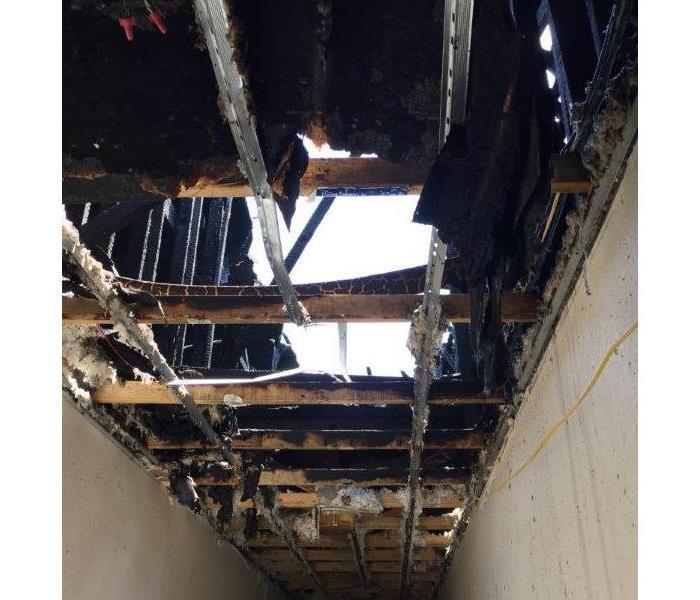 Trust the professionals.
Trust the professionals.
Did you know that more home fires occur on Saturday and Sunday? According to the Red Cross, they do! In fact, they refer to home fires as America's biggest disaster threat.
We all know that home fires are the most likely to begin in the kitchen. Recently on our social media, we asked what you thought the leading cause of home fires in the winter was. A lot of you said space heaters but the answer is actually still cooking. We want to stress that no matter what the weather is like outside that you have to be careful in the kitchen.
On top of home fires, business fires can be absolutely devastating as well. Thankfully, we are here to help. Whether it is your home or your business, we can make it "Like it never even happened." You can give us a call 24/7 when a fire happens (big or small) at (334) 821-4858.
Lee County Home Fires
1/9/2018 (Permalink)
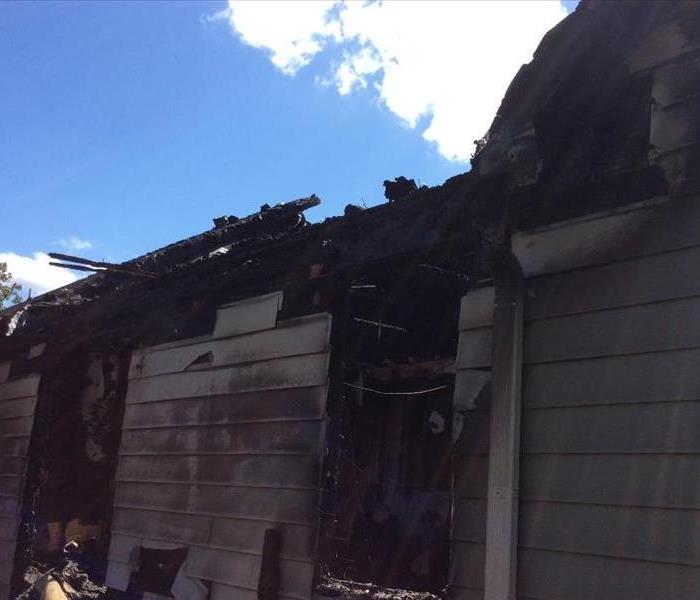 Let us help you today!
Let us help you today!
Damage caused by a fire is devastating for your home and for your family. It’s a stressful and confusing time, so you’ll need a caring expert to guide you through this crisis. Our professionals will always treat you with respect and empathy, and we’ll always treat your home and belongings with great care. Besides the obvious advantage of lower costs, our “restore first” mentality also gets you back into your home or business quicker and with less disruption to your life. Our restoration specialists are highly trained and will get the job done right.
Remember that we are here for you 24 hours a day, 365 days a year so never hesitate to give us a call at (334)-821-4858 so we can get your home back to "Like it never even happened."
California Wildfires
12/19/2017 (Permalink)
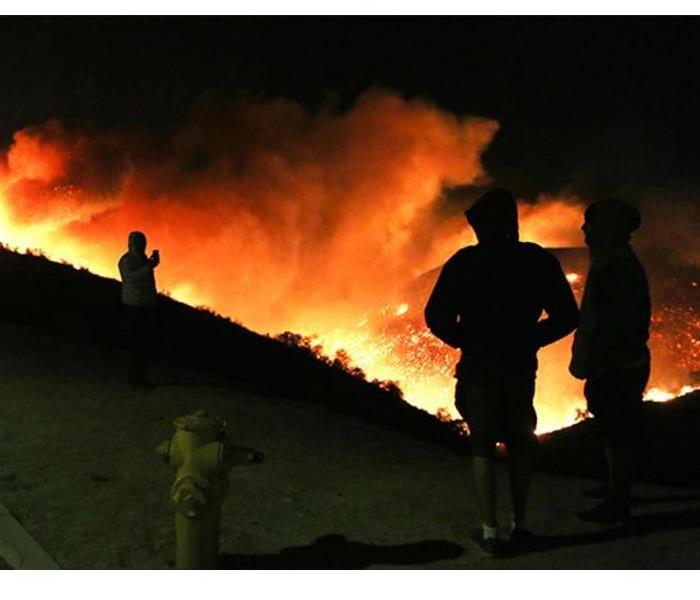 Photo Credit goes to NBC Los Angeles
Photo Credit goes to NBC Los Angeles
California currently has four major fires raging in their state in different areas. Officials say that this is due to last winter being one filled with more rain than prior years which then left the hillsides covered in vegetation. However, when their dry summer rolled around, it turned that grass into tinder which become the fuel that allowed this to spread so easily with the strong winds. These pictures are absolutely heartbreaking and look almost like something out of a movie but it is very, very real for those in the area.
Although we are here in Alabama, we wanted to provide a resource for those who may have loved ones in the area. Regardless of the extent of the damage, SERVPRO Franchise Professionals can handle any size disaster. During catastrophic events like the wildfires in Southern California, our Disaster Recovery Team can respond quickly with additional resources. You can call 1-800-SERVPRO to locate your nearest franchise. We have a network of over 1,700+ franchises so please know that we are all here to help.
Our thoughts and prayers will continue to be with those being affected by this absolutely devastating event.
Link to Photo and Article
Christmas Tree Safety
12/18/2017 (Permalink)
Have you seen this post by NFPA?
We wanted to post a quick re-cap on our blog so that our customers would be aware of the potential dangers involving a Christmas tree fire!
Step 1: When picking your tree, make sure it is fresh! If needles fall off when you touch it, it is best to find another tree. Look for the perfect tree with healthy green needles!
Step 2: When you place your tree, ensure that it is three feet away from any heat source (fireplace, heat vent, etc.) AND ensure that it is not blocking an exit.
Step 3: Check your lights. Make sure they are for indoor use and always turn them off before leaving your house or going to bed.
Step 4: Water your tree daily!
Last but not least- Step 5: After Christmas is over and you're getting rid of your tree make sure to place the dried out tree outside of your home. Check with your local community to find a recycling program. AND bring your outside lights in to prolong their life!
Check out the article from NFPA for more information and we hope that everybody has a safe and Merry Christmas!
Let's Meet Again
10/24/2017 (Permalink)
It's been a while since we've introduced ourselves so allow us to re-introduce ourselves to you! We are SERVPRO of Lee County. We are nationally known but locally owned. We are a part of a network of 1,700+ and growing franchises! We are experts in residential and commercial restoration and cleaning. Learn more about residential services by clicking here or learn more about commercial services by clicking here. We are so proud to serve our local communities. Give us a call today and see what we can do for YOU at (334) 821-4858.
Don't believe us? Check out our testimonials here! Please see the top right of your screen and follow the links to our social media and follow us there! We'd love to hear from you!
Fire Do's and Don'ts
7/6/2017 (Permalink)
What To Do After A Fire
- Limit movement in the home to prevent soot particles from being embedded into upholstery and carpets.
- Keep hands clean so as not to further soil upholstery, walls and woodwork.
- Place clean towels or old linens on rugs, upholstery and carpet traffic areas.
- If electricity is off, empty freezer and refrigerator and prop doors open.
- Clean and protect chrome with light coating of petroleum jelly or oil.
- Wash houseplants on both sides of leaves.
- Change HVAC filter.
- Tape double layers of cheesecloth over air registers.
What NOT To Do After A Fire
- Don't attempt to wash any walls or painted surfaces or shampoo carpet or upholstery without contacting us.
- Don't attempt to clean any electrical appliances that may have been close to fire, heat or water without consulting an authorized repair service.
- Don't use any canned or packaged food or beverages that may have been stored near the fire, heat or water.
- Don't turn on ceiling fixtures if ceiling is wet. The wiring may be damaged.
- Don't send garments to an ordinary dry cleaner. Improper cleaning may set smoke odor.
SERVPRO of Lee County is locally owned and operated, so we’re already close by and ready to respond immediately when you need us. We make disaster "Like it never even happened." Give us a call today at (334)-821-4858!
Smokewebs
7/6/2017 (Permalink)
Your first thought when you look at the picture on the left may be “oh, those are cobwebs” but it is actually something that we refer to as smoke webs, soot webs, or even soot tags! That is a picture from a home that we visited where the smoke webs appeared in the same room as where the fire started.
With a quick Google search, you can read about the science behind it but we will save you the search. In short, it’s when plastics burn, the smoke carries a stronger charge than when wood, cotton or paper burns. Sometimes, this causes smoke residue to form the smoke webs. Depending on what exactly the webs are made of, they can be sticky, smeary, and more difficult to clean. Don’t worry. We are here to help!
Don't forget to like us on Facebook!
SERVPRO of Lee County is locally owned and operated, so we’re already close by and ready to respond immediately when you need us. We make disaster "Like it never even happened." Give us a call today at (334)-821-4858!
Put a Lid On It
7/6/2017 (Permalink)
See that picture to the right? That’s a picture from one of our local jobs! Unfortunately, it happens all too often. Some, not all, of these can be prevented and we are here to tell you how. In most cases, stove top fires occur when cooking oil gets too hot. That temperature varies from product to product. Cooking oils can ignite from 520°F up to 670°F.
Here is what to do if and when that happens:
- Call 911. They don’t mind showing up to a house when the fire is already out but when home fires occur, every second counts!
- Fire is a rapid oxidation reaction. If you remove oxygen, that reaction stops. So put a lid on your cooking. It may take a minute, but that one simple action can sometimes be all it takes to stop a stove top fire. If you don’t have a lid for that pot or pan, try sliding a cookie sheet over it.
- Remember, the fire occurred because the oil reached the temperature in which it ignites at. The next stop is to turn off the heat to try.
- Do not pour water on the burning pot and do not try to move it to a different location.
- If the steps above do not help put out the fire, use your kitchen fire extinguisher to try and put out the fire and wait in a safe area for the fire department to arrive.
Just remember to use caution. Don’t try and turn up the heat to get your pot to heat up faster- because you may forget to turn it back down. Stay around the stove and keep an eye on your cooking. In the event that a fire isn’t prevented and causes any damage, we are here to help make your disaster “Like it never even happened.”
SERVPRO of Lee County is locally owned and operated, so we’re already close by and ready to respond immediately when you need us. We make disaster "Like it never even happened." Give us a call today at (334)-821-4858!
Fourth of July Fireworks Safety
6/27/2017 (Permalink)
 Have a great weekend!
Have a great weekend!
With the Fourth of July approaching, we figured that we should review fireworks safety, just as we did last year. The estimated annual cost of fireworks-related injuries is $100 million. Fireworks-related fires have caused at least $15 to $20 million in property loss each year in the past decade.
Fireworks are beautiful to watch but here are a few simple rules to keep in mind:
- Make sure fireworks are legal in your area before purchasing them.
- Never try to re-light a dud and always light one at a time (and remember, stand back)
- Although, this may seem like common sense, statistics say that this reminder is needed- use fireworks outside only
- ALWAYS supervise both children and pets when they are in a close proximity to the area in which the fireworks are being lit
- Do not experiment with homemade fireworks. Always buy from a trusted fireworks distributer.
And last, but not least, while keeping safety rules in mind, don't forget to have fun! Enjoy the weekend and your day off of work.
SERVPRO of Lee County is locally owned and operated, so we’re already close by and ready to respond immediately when you need us. We make disaster "Like it never even happened." Give us a call today at (334)-821-4858!
Grill Safety
5/16/2017 (Permalink)
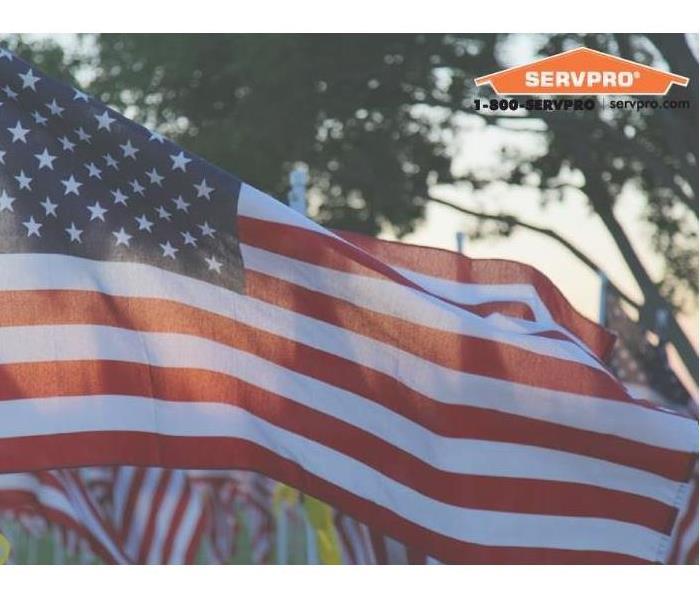 “A hero is someone who has given his or her life to something bigger than oneself” —Joseph Campbell
“A hero is someone who has given his or her life to something bigger than oneself” —Joseph Campbell
Memorial Day weekend is coming up! We're here on the blog to give some grill safety tips. With the summertime in full swing, we are all enjoying time by the pool and barbeques with our friends and family. We can’t forget that grills are responsible for an estimated 8,900 home fires a year. The National Fire Protection Association (NFPA) offers these general grilling guidelines:
- Only use propane and charcoal grills outdoors.
- Place grills away from your home (remember, this counts deck railings!)
- As always, keep children and pets away from the grill area
- Make sure you keep your grill clean by removing the grease or fat buildup from the grills and in trays below the grill (keep in mind that the leading cause of a grill fire is failure to clean)
- NEVER leave the grill unattended
Who’s ready to throw the hotdogs and hamburgers on the grill this weekend and celebrate how blessed we are to live in a beautiful and free country? We know we are! Keep in mind these safety rules and have a great summer with your family and friends.
All gave some, some gave all.
SERVPRO of Lee County is locally owned and operated, so we’re already close by and ready to respond immediately when you need us. We make disaster "Like it never even happened." Give us a call today at (334)-821-4858!
National Electrical Safety Month
5/15/2017 (Permalink)
The month of May is National Electrical Safety Month. You can prevent a fire by looking for electrical hazards. Avoids running cords under rugs or behind furniture. Don't leave your laptop on a sofa or bed charging. Don't overload your outlets. Use the correct wattage light bulbs in their prospective lamps. Smoke alarms should be in every bedroom and outside in the hallways (and remember to test them once a month or so!). Use surge protectors and don't overload extension cords. The National Electrical Manufacturers Association estimates that 60-80% of surges originate from internal sources inside your home or business. Keep your home or business as safe as you can by practicing electrical safety.
Remember, if your home is affected by an electrical fire, we are here to help.
SERVPRO of Lee County is locally owned and operated, so we’re already close by and ready to respond immediately when you need us. We make disaster "Like it never even happened." Give us a call today at (334)-821-4858!
Returning to Normal After a Fire
5/8/2017 (Permalink)
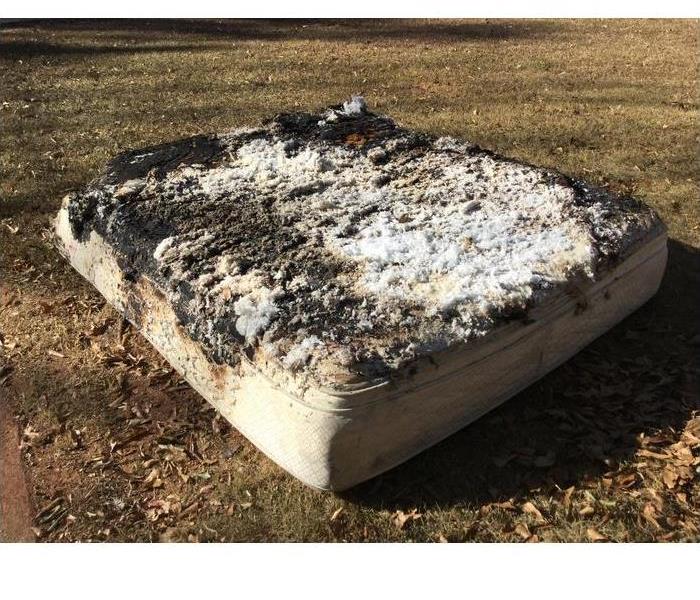 Your belongings can be replaced, you can't.
Your belongings can be replaced, you can't.
In June of 2016, FEMA put out a great PDF file for returning to normal after a fire. You can see that here. But we also wanted to highlight a few things in our blog for our customers to be able to see at a glance.
In June of 2016, FEMA put out a great PDF file for returning to normal after a fire. You can see that here. But we also wanted to highlight a few things in our blog for our customers to be able to see at a glance.
First thing is first. Do not eat, drink or breathe in anything that has been near the flames, smoke, soot, or water used to put the fire out.
Secondly, your pets are family, too. If you have pets, find and comfort them.
Third, Contact your insurance company right away. They'll tell you the next steps. Normally, that means giving us a call.
SERVPRO of Lee County is locally owned and operated, so we’re already close by and ready to respond immediately when you need us. We make disaster "Like it never even happened." Give us a call today at (334)-821-4858!
Exit a Fire
3/9/2017 (Permalink)
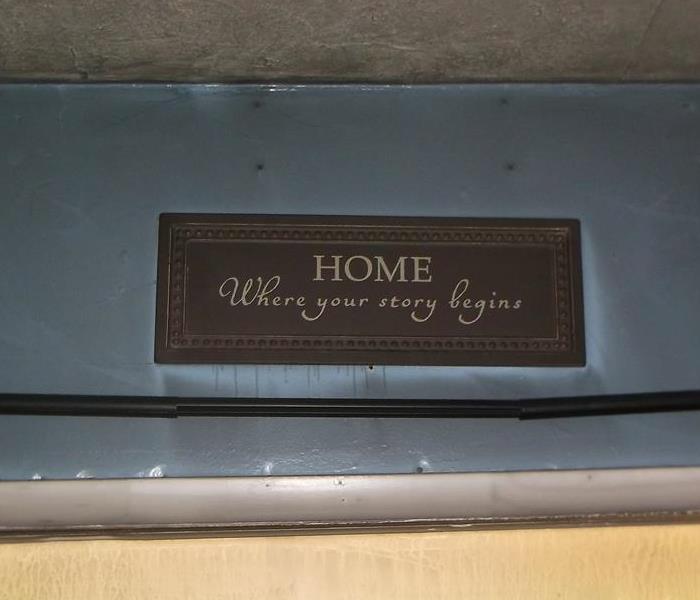 Home: where the story begins.. but don't let a fire be where it ends. Let us help make it "Like it never even happened."
Home: where the story begins.. but don't let a fire be where it ends. Let us help make it "Like it never even happened."
Thanks to NFPA, we've got some great advice to give you on exiting a fire.
First, get the family together and make a plan. Next, choose an outdoor meeting place so that you can all end up in the same place safely. Go ahead and double check that your street number in visible- if not, take a Saturday morning to paint it on to ensure that emergency personnel can find your home. Practice your drill and take it seriously to ensure that everyone understands the plan that you first devised. If somebody in the family isn't easily awoken by the fire alarm, make sure somebody is assigned with the task to wake them up in the event of a fire. Lastly, get out safely. Your home can be replaced, your family can't. Let us help you put the pieces back together. Give us a call after your fire (big or small).
SERVPRO of Lee County is locally owned and operated, so we’re already close by and ready to respond immediately when you need us. We make disaster "Like it never even happened." Give us a call today at (334)-821-4858!
Fire Damage Tips
7/7/2016 (Permalink)
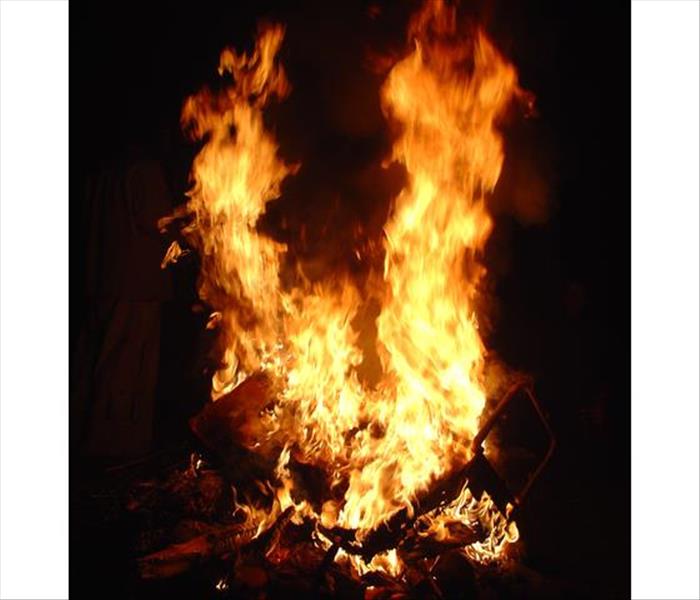 We're locally owned and operated, so we’re already close by and ready to respond immediately when you need us. Give us a call today at (334)-821-4858!
We're locally owned and operated, so we’re already close by and ready to respond immediately when you need us. Give us a call today at (334)-821-4858!
After any fire damage situation, your primary focus should be safety first:
- Is it safe to stay in the house?
- Electrical and "slip and fall" hazards are some of the most prevalent concerns.
- Only do activities that are safe for you to perform.
- Wet materials can be VERY heavy. Be careful!
Have Smoke or Fire Damage? Call (334) 821-4858
What To Do After A Fire
- Limit movement in the home to prevent soot particles from being embedded into upholstery and carpets.
- Keep hands clean so as not to further soil upholstery, walls and woodwork.
- Place clean towels or old linens on rugs, upholstery and carpet traffic areas.
- If electricity is off, empty freezer and refrigerator and prop doors open.
- Clean and protect chrome with light coating of petroleum jelly or oil.
- Wash houseplants on both sides of leaves.
- Change HVAC filter.
- Tape double layers of cheesecloth over air registers.
What NOT To Do After A Fire
- Don't attempt to wash any walls or painted surfaces or shampoo carpet or upholstery without contacting us.
- Don't attempt to clean any electrical appliances that may have been close to fire, heat or water without consulting an authorized repair service.
- Don't use any canned or packaged food or beverages that may have been stored near the fire, heat or water.
- Don't turn on ceiling fixtures if ceiling is wet. The wiring may be damaged.
- Don't send garments to an ordinary dry cleaner. Improper cleaning may set smoke odor.
SERVPRO of Lee County is locally owned and operated, so we’re already close by and ready to respond immediately when you need us. We make disaster "Like it never even happened." Give us a call today at (334)-821-4858!
Put a Lid on It
7/7/2016 (Permalink)
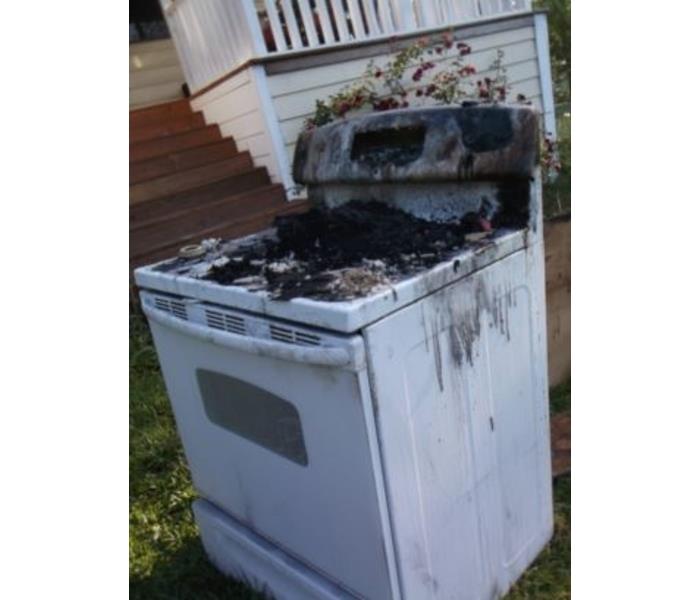 Help "put a lid" on stove top fires by remembering the simple safety tips that were given!
Help "put a lid" on stove top fires by remembering the simple safety tips that were given!
See that picture to the right? That’s a picture from one of our local jobs! Unfortunately, it happens all too often. Some, not all, of these can be prevented and we are here to tell you how. In most cases, stove top fires occur when cooking oil gets too hot. That temperature varies from product to product. Cooking oils can ignite from 520°F up to 670°F.
Here is what to do if and when that happens:
- Call 911. They don’t mind showing up to a house when the fire is already out but when home fires occur, every second counts!
- Fire is a rapid oxidation reaction. If you remove oxygen, that reaction stops. So put a lid on your cooking. It may take a minute, but that one simple action can sometimes be all it takes to stop a stove top fire. If you don’t have a lid for that pot or pan, try sliding a cookie sheet over it.
- Remember, the fire occurred because the oil reached the temperature in which it ignites at. The next stop is to turn off the heat to try.
- Do not pour water on the burning pot and do not try to move it to a different location.
- If the steps above do not help put out the fire, use your kitchen fire extinguisher to try and put out the fire and wait in a safe area for the fire department to arrive.
Just remember to use caution. Don’t try and turn up the heat to get your pot to heat up faster- because you may forget to turn it back down. Stay around the stove and keep an eye on your cooking. In the event that a fire isn’t prevented and causes any damage, we are here to help make your disaster “Like it never even happened!”
SERVPRO of Lee County is locally owned and operated, so we’re already close by and ready to respond immediately when you need us. We make disaster "Like it never even happened." Give us a call today at (334)-821-4858!
Smokewebs
7/7/2016 (Permalink)
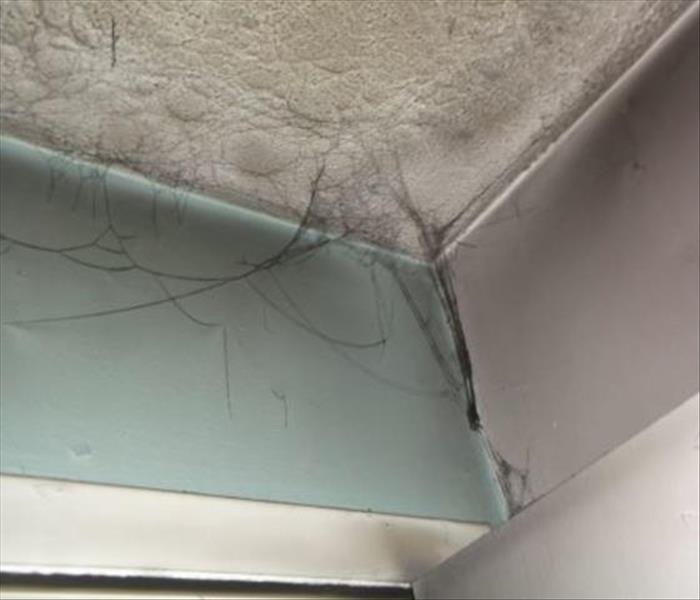 A great example of a smoke web from one of our jobs!
A great example of a smoke web from one of our jobs!
Your first thought when you look at the picture on the left may be “oh, those are cobwebs” but it is actually something that we refer to as smoke webs, soot webs, or even soot tags! That is a picture from a home that we visited where the smoke webs appeared in the same room as where the fire started.
With a quick Google search, you can read about the science behind it but we will save you the search. In short, it’s when plastics burn, the smoke carries a stronger charge than when wood, cotton or paper burns. Sometimes, this causes smoke residue to form the smoke webs. Depending on what exactly the webs are made of, they can be sticky, smeary, and more difficult to clean. Don’t worry.We are here to help!
Don't forget to like us on Facebook here!
SERVPRO of Lee County is locally owned and operated, so we’re already close by and ready to respond immediately when you need us. We make disaster "Like it never even happened." Give us a call today at (334)-821-4858!
Fireworks Safety Tips for Independence Day
7/7/2016 (Permalink)
 Happy Independence Day from your friends here at SERVPRO of Phenix City, Eufaula and Tuskegee / SERVPRO of Lee County
Happy Independence Day from your friends here at SERVPRO of Phenix City, Eufaula and Tuskegee / SERVPRO of Lee County
With the Fourth of July approaching, we figured that we should review fireworks safety. The estimated annual cost of fireworks-related injuries is $100 million. Fireworks-related fires have caused at least $15 to $20 million in property loss each year in the past decade.
Fireworks are beautiful to watch but here are a few simple rules to keep in mind:
- Make sure fireworks are legal in your area before purchasing them.
- Never try to re-light a dud and always light one at a time (and remember, stand back)
- Although, this may seem like common sense, statistics say that this reminder is needed- use fireworks outside only
- ALWAYS supervise both children and pets when they are in a close proximity to the area in which the fireworks are being lit
- Do not experiment with homemade fireworks. Always buy from a trusted fireworks distributer.
And last, but not least, while keeping safety rules in mind, don't forget to have fun! Enjoy the long weekend.
SERVPRO of Lee County is locally owned and operated, so we’re already close by and ready to respond immediately when you need us. We make disaster "Like it never even happened." Give us a call today at (334)-821-4858!





 24/7 Emergency Service
24/7 Emergency Service
